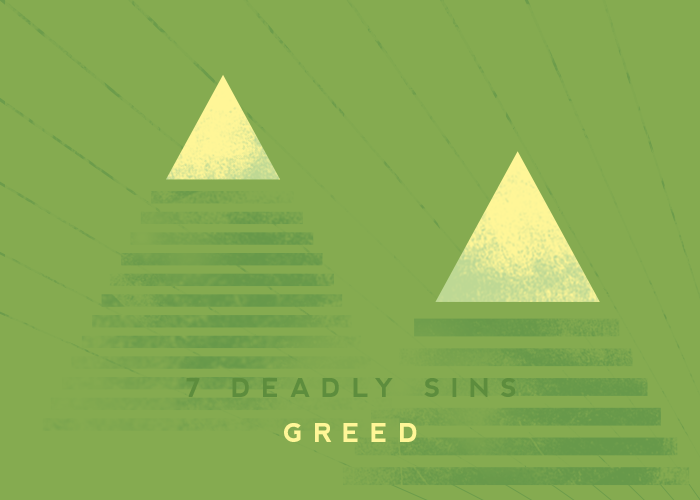7 DEADLY SINS: GREED

Written by Doug Ponder on January 24, 2016
What Is the Sin of Greed?
The seven deadly sins form a list of vices considered especially dangerous because of their destructive nature and their tendency to entangle us in many other sins. Though the label “seven deadly sins” is not found in the Bible, it has been used by Christians for centuries as a helpful way of summarizing the wide-ranging patterns of human sinfulness. This post examines greed.
The old school word for greed is avarice, which comes from the Latin word that means “craving.” Like the sin of lust, greed craves something that isn’t necessarily wrong in itself (physical things), but greed craves these things excessively.
Why No One Is Greedy (And Everyone Is)
In his masterful book Counterfeit Gods: The Empty Promises of Money, Sex, and Power, and the Only Hope that Matters, pastor Tim Keller writes:
Some years ago I was doing a seven-part series of talks on the Seven Deadly Sins at a men’s breakfast. My wife, Kathy, told me, “I’ll bet that the week you deal with greed you’ll have your lowest attendance.” She was right. People packed it out for “Lust” and “Wrath” and even for “Pride.” But nobody thinks they are greedy.
As a pastor I’ve had people come to me to confess that they struggle with almost every kind of sin. Almost. I cannot recall anyone ever coming to me and saying, “I spend too much money on myself. I think my greedy lust for money is harming my family, my soul, and people around me.” Greed’s modus operandi includes blindness to your own heart.
Why can’t anyone in the grip of greed see it? The counterfeit god of money uses powerful sociological and psychological dynamics. Everyone tends to live in a particular socioeconomic bracket. Once you are able to afford to live in a particular neighborhood, send your children to its schools, and participate in its social life, you will find yourself surrounded by quite a number of people who have more money than you. You don’t compare yourself to the rest of the world, you compare yourself to those in your bracket.
The human heart always wants to justify itself and this is one of the easiest ways. You say, “I don’t live as well as him or her or them. My means are modest compared to theirs.” You can reason and think like that no matter how lavishly you are living. As a result, most Americans think of themselves as middle class, and only 2 percent call themselves “upper class.” But the rest of the world is not fooled. When people visit here from other parts of the globe, they are staggered to see the level of materialistic comfort that the majority of Americans have come to view as a necessity.
Jesus warns people far more often about greed than about sex, yet almost no one thinks they are guilty of it. Therefore we should all begin with a working hypothesis that “this could easily be a problem for me.” If greed hides itself so deeply, no one should be confident that it is not a problem for them.”
In other words, nobody thinks they’re greedy. But almost everyone struggles with greed. Whether poor or rich or anything in between, we feel that, that insatiable craving for more.
The Deadliness of Greed
As amazing as it may seem, the Bible talks more about money and the dangers of greed than any other sin! The hypocritical Pharisees were called ‘lovers of money’ (Luke 16:14). John the Baptist warned people against discontent with their income (Luke 3:13). Jesus warned people to ‘watch out’ and be on guard against ‘greed’ (Luke 12:15a), and against worrying about money (Luke 12:22), and against frantic pursuits (Luke 12:30), and against finding your worth and identity from your economic status (Luke 12:15b). Jesus even said that if money, comfort, and reputation are too important to you, you will not enter the kingdom of God (cf. Luke 6:24-26). That’s how dangerous greed is.
The question is, Why? What’s so wrong with greed? The problem with greed, and its cousin selfishness, is that it turns the gifts of God into a cesspool instead of a conduit for grace. That is what earthly ‘things’ are for, after all. They are gifts from God (Jas. 1:17) to be enjoyed (1 Tim. 6:17) and extended to others (1 Tim. 6:18).
Greed is deadly because it trains our hearts to put its hopes for joy and comfort in temporary things instead of in Jesus. Instead of receiving physical things as gifts from God to be enjoyed and extended (through sharing) with others, we worship these things by living for them. We work extra hours, we sacrifice needlessly, or perhaps we are even driven to theft. We do these things because we believe that what we’re greedily craving will bring us lasting comfort and joy.
But physical things will always fail us at this point. They were never meant to fill the void that only God can fill. The Creator is still better than his creation, and when we worship the gifts more than the Giver, we will always feel empty inside. That’s the trap of greed. We keep craving more without ever getting enough. Greed is like a giant tapeworm of the soul.
God’s Solution for Greed
God saves us from greed in two ways. First, he opens our eyes to the problem gnawing at us. Second, he works in us to loosen the grip that greed has on our hearts as we loosen our hold on the things of the world.
First, we have to recognize the greed that lurks in our hearts, and this is where we find ourselves:
(1) The Bible continually warns us about the danger of greed.
(2) Yet virtually no one thinks they are guilty of greed.
(3) Therefore, a great number of us are blinded by the greed in our lives.
The only responsible thing to do is go on the working hypothesis that we are already infected by greed and must be on guard against it. If the love of money and material possessions is this subtle and dangerous, then greed is a lot like alcoholism: the first step to recovery is admitting we have a problem. That’s why Tim Keller writes, “Maybe the best sign of greed is that you aren’t willing to even admit the possibility that you are enslaved to it.”
The reason why it is so difficult to admit we are enslaved to greed is because the vice enjoys a relative definition that all but defies conviction. In other words, our definition of greed constantly changes with the desires of our hearts. When our desire for more money/possessions (etc.) is enlarged, the standard of greed is enlarged as well.
In other words, our hearts define greed as more than what I have (now) or more than what I need (for all of my wants). Thus greed is either abstractly defined as “too much money” (which always excludes you) or greed is relatively defined as “more than you need” (which overlooks the nature of the “needs” themselves).The result of this is twofold: first, it blinds us to the greed and materialism already present in our lives; second, it allows for the (supposed) justification of a greedy lifestyle without directly knowing that one is living in such a way. That is why the first step to being freed from the power of greed is to admit that yes, even if you have never thought so before, you almost certainly have a greed problem.
The second step in God’s solution is to trust him when he says that he is better and more satisfying and more rewarding and more worthy of living for than whatever physical things we are craving. As we said with lust before greed: the Giver is always better than his gifts!
In other words, if you have tasted the grace of God, why do you persist in building your life on the abundance of possessions, comfort, and security? Instead, grace leads us to gratitude and to generosity, which is the true sign that greed is losing its grip on our hearts. That is why the virtue that opposes greed is not contentment, but charity—the kind of love that gives. As we learn to recognize our incessant craving for what it is (the deadly sin of greed), God reminds us of his all-satisfying goodness. This leads us beyond contentment to generosity, moving us to enjoy what God has given and to share it with others, both of which begin to put greed to death.






